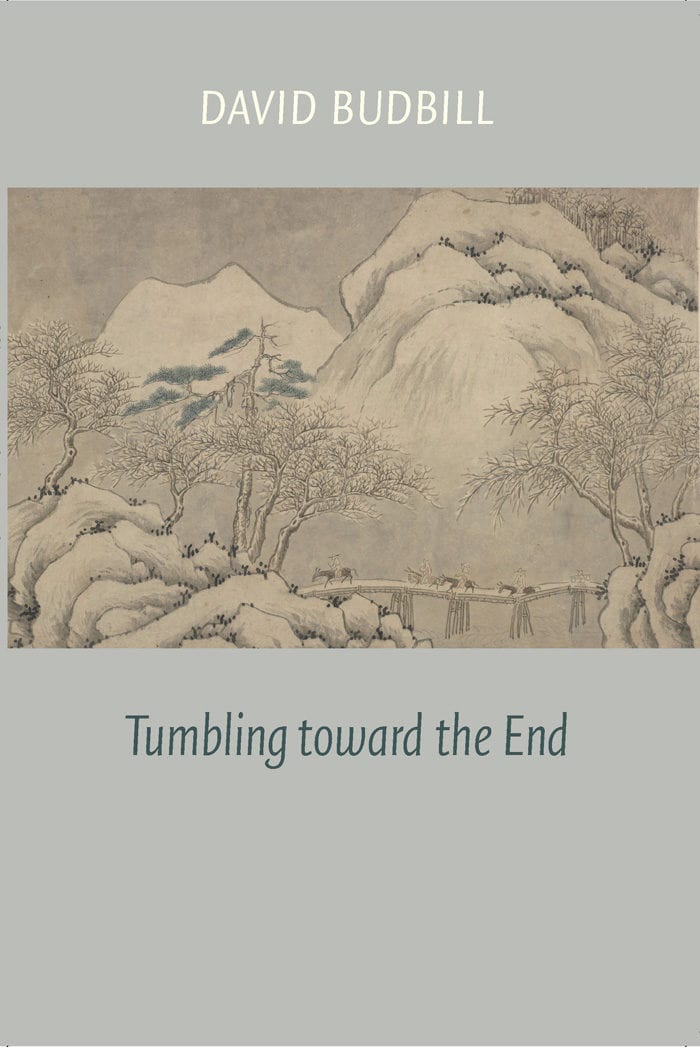Tumbling Toward the End by David Budbill

I first read Tumbling Toward the End in April 2023, in one sitting, aloud with my wife. Having just lived through our first winter in Vermont, we recognized a lot of what Budbill was talking about. Though we lived in an apartment in a downtown area, Budbill’s constant descriptions of “getting ready for the winter,” of chopping and canning, of relishing being a place so far away from “the world” and so respective of insularity, feeling like you never want to leave, resonated with us.
My wife and I laughed out loud while reading many of the poems the first time around. Though he’s obsessed with death, Budbill has a soothing sense of humor that is critical of human aspirations ("But when I get it [emptiness, not having to see anyone], I don't know / what to do with it, and then / I wish I didn't have it.") and in which hatred for the world and affirmation of the world’s sweetness interact (plus, as I mentioned, he let out a lot of “inside jokes” about the place we felt in on). This time around, though, I got quite emotional while reading. I guess Budbill is like Beckett or Don Quixote in that way.
The book is arranged in order from January to December. From ordering his seeds on a subzero February day, Budbill goes on to describes his rituals as he lives them for one last time on Judevine Mountain. The poems are extremely spare. This is neither because of any minimalist urge on Budbill’s part nor because they are symptomatic of some kind of “late style,” but because—as many people have commented about Budbill—his work is plain and simple, resourceful and resilient like orange daylillies. He claims in “More and More Now” that:
I want to say
less and less
chickadee
buttercup squash
firewood
maple leaves
chrysanthemum
and that’s the whole thing. Lots of contemporary writing, most of it narrative, aspires towards this simplicity but the ego gets in the way. That is, the ostensible subject to whom these perceptions would arise take control of the feeling at the last second, turning it into some kind of narrative knowledge of themselves, some way of giving themselves coherence. But in these poems Budbill is not afraid to die, and he leaves these perceptions for future readers to inhabit as they take in similar sights, on Judevine Mountain or otherwise. So it is that Budbill closes his account of smoking his sausages for the winter by saying that “the sausages and I were done,” making the moment about “the Flow” (or whatever one wants to call it) to which Budbill and sausages, and whatever comes next, belongs by virtue of being. Budbill’s simplicity counsels against attempting to rise above this flow through grandiose achievements, of attempting to find “closure” above and beyond what the Flow of ordinary life gives. While speaking of the migratory birds for the umpteenth time in one poem, Budbill closes: “sounds reassuring that we are / all here together and / heading south, all of us just passing / through, just passing / through, just passing through, just / passing through.”
So for all the talk of death, there’s never any “closure” or “fear,” just acceptance and appreciation, like an old dog he describes seeing two days in a row from his window at a hotel in Montreal:
He's old,
he’s overweight,
he moves real slow,
he waddles along
wagging his tail
the whole way.
Speaking of style, these lines do betray Budbill’s surreptitious sophistication—or, at least, the manner in which he does belong to a particular set of questions about prosody or syntax. I’m thinking of the way many of the poems take on the shape of Williams’s three-step variable foot line, which Williams declared to be the shape ordinary speech naturally took in verse. In “No Fake Mystery,” a poem set off by an epigraph from Williams (“Say what you see”), Budbill writes:
Say what you see.
Get it down right.
Accuracy is plenty.
What’s here
is good enough.
On the eve of going back to teaching for the school year, it’s nice to read Budbill’s work, which is an art of appreciation for cycles and rituals, of pain and death, of remembering that “[i]f you focus / on this day … there is nothing / to worry about.” These latter lines are a kind of motto for the book, stating that presence is more important than whatever you think is important to get done in the world. That's because presence is what makes close attention to the world possible, no matter whether you find importance in the small details or large ones.

Comments
Post a Comment